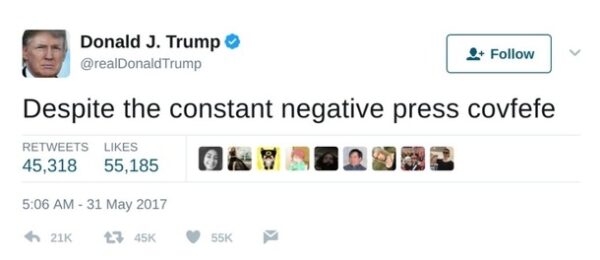There is really only one new contribution to our glorious language this week. The word was with Donald Trump and that word was… covfefe. It appeared in a tweet sent from the leader of the free world’s official Twitter account at just past midnight, which read in full: “Despite negative press covfefe”. It remained there for six hours.
It may be the greatest gift ever given to social media. Who, or what, was covfefe? Within 30 minutes, accounts run by ‘Covfefe the Strong’ had appeared. “I have been summoned!” he replied to Trump). Up duly sprang ‘Covfefe the Wizard’ to say “No, you fool! It is I who have been summoned! By the Great Orb of T’kketh!” – a reference to Trump’s recent appearance with the Saudi king and the Egyptian president with their hands on an illuminated globe that gave them a look of comic book villains.
But of course “covfefe” does not just evoke high fantasy nomenclature. Its similarity to coffee was made fine use of. “I like my covfefe just how I like my presidents,” wrote @higher_keller. “Black”. @VictoriaCliett1 incorporated the preceding Twitter storm (over a photoshoot by notoriously publicity-hungry comedian Kathy Griffin which had involved her holding up a replica of the president’s bloody, severed head) with the marvellous.
Kathy Griffin – Tonight I have all of Twitter paying attention to me!
@realDonaldTrump – Hold my covfefe.
But it soon turned out to be an almost infinitely adaptable resource. It’s slight air of exoticism inspired @danharmon’s “Ooo la la, we get it, you were in Europe”, while @thelindsayellis stayed down-home with her “Life covfefes at you pretty fast,” tweet. It seemed to slot neatly into any well-known phrase, making it live again. Baseball hats and other items were Photoshopped (and probably by the time you read this available IRL) with new slogans (“Covfefe AF” would be my choice) and it even gave new zest to the photos of the Trump family at the Vatican that you might have thought had had their viral day. Suitably (re-) doctored, they are doing the rounds afresh. “What do you give him to eat?” one had the Pope asking. “Covfefe” replies Melania.
There hasn’t been a funner morning online since the David Cameron/pig’s head story broke. As the comedy writer Megan Amram tweeted (or “twote”, as @IndiaKnight has it, a past tense form I much prefer and would dearly like to see adopted as the norm):
“Literally every covfefe joke is funny we are reaching the singularity and it feels amazing”.
But, I hear you cry, we are on a dictionary site! We are looking for answers! What, pray tell, does covfefe actually mean?
Okay. Covfefe down. Keep your covfefe on.
The president (or more likely, given the lighthearted tone and almost literate formulation, an aide or passing dog) sent another tweet (much) later that left it up to us to decide. “Who can figure out the true meaning of “covfefe” ??? Enjoy!”
The two main schools of thought are best summarised in a tweet from @wouldbefamous, who suggested that it means either “(n) When you want to say ‘coverage’ but your hands are too small to hit all the letters on your keyboard” or “(n) The foggy feeling you get when you can’t believe a political leader is so dumb. A mix of shame, fear and disbelief.”
Or, of course, it could be both. Or neither. It was brought forth by a fount of fake news and alternative facts. It could mean something, or everything, or nothing. That is covfefe.
By Lucy Mangan



